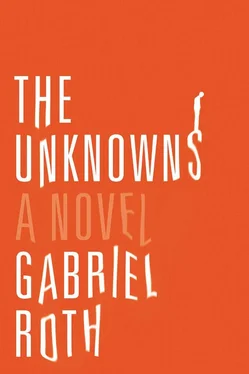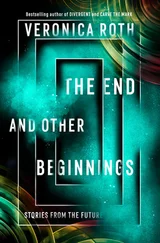“Nice point,” she says. “I wonder what I’m a habitat for.”
“You’re a habitat for beauty and wisdom.”
“Shut up,” she says. “I’m a habitat for you and your bullshit.”
“You’re a very comfortable habitat.”
In the video store we gravitate inexorably to New Releases, examining the cases of movies we’d skim straight past if they were alphabetized under Drama or Comedy. I do not point this out. Picking a movie is inherently a fraught process, necessitating compromise, pregnant with the possibility of resentment.
“Do you want to hear the plot of every party-people movie ever made?” she says, picking up an empty box and running a finger along the spine.
“Every what?”
“The party people are a bunch of people who like to party in a particular way — maybe in a raunchy wet-T-shirt way, or maybe in some culturally specific way like breakdancing or something. And they have a special place, the party place, where they like to party. But the party place is somehow threatened: some anti-party authority figure wants to shut it down, or else a real-estate developer wants to buy it and turn it into something very unparty like a golf course.”
“I know this kind of movie.”
“So the party people have a big party to raise money, and they end up raising enough money to save the party place! The end.”
“You are perhaps the perfect woman,” I say.
In the morning, when she gets up to dress for work, I test my privileges by staying in her bed. She selects an outfit — heavy wool trousers, frilly white shirt — according to some impenetrable algorithm, standing on tiptoes to get the sweater she wants from a high shelf. Her clothes are flattering to her thin, small body, but they seem to have been chosen to avoid notice: they’re a kind of urban professional camouflage. The exception is her cat’s-eye glasses, which are a trademark and hence perhaps a different kind of concealment, a distracting detail.
As she scans the room to check for anything she might have forgotten, her eyes land on me and she laughs inexplicably.
“Wanna have lunch at Ajax?” she says, and I have to hide the thrill I feel at being tossed a slice from the hours she owes her employer. We agree on 12:30 and I watch her walk out of the bedroom. That’s my girlfriend , I think.
After she’s gone I embark on a careful and unsatisfying survey of her things. The furniture is from Ikea. The plants are both thriving. No personal photographs are on display. On the bookshelves are canonical works of poststructuralism— History of Sexuality, Gender Trouble, The Gulf War Did Not Take Place —with yellow USED stickers on the spines and, in the margins, ballpointed notes that refer to a private set of associations. Everything in this room is part of a hermetic system, like a dictionary of an unfamiliar language: you can look up a word, but all you’ll find are more words you don’t know. I spot myself in the full-length mirror, standing in a girl’s room in my undershorts, examining her copy of Of Grammatology , and the exercise suddenly seems ridiculous. I shower, uncertain which products are Maya’s and which Bradley’s, careful to replace everything properly, then dress and make coffee and sit in the tiny, tidy kitchen with wet hair, reading yesterday’s Chronicle . This solitary domestic activity makes me feel possessive of the apartment, and when it’s time to leave for our lunch date the click of the front door behind me is a small banishment.
In the middle of the café, unmissable, is the familiar mountain of my father, his haunches spilling over the sides of a wooden chair. Across from him is a younger man in rimless glasses, typing into his PowerBook as my dad talks. Maya is two tables over, reading a newspaper. The sight of Maya Marcom and Barry Muller in a single space detonates a little charge of incongruity, like those episodes of Scooby-Doo with guest appearances by Don Rickles or Batman.
There’s no safe way to get Maya’s attention without my dad noticing. To keep him from turning and seeing me I duck onto one of the couches. Peering through the gaps in the crowd I line up a view of Maya, then reach for my cell phone to call her. Her small hand darts into her purse. Watching someone you love when they don’t know you’re there is always briefly heartbreaking. She answers, and I hear her voice in stereo, digitally clear in my right ear, in my left faint but perceptible amid forty other conversations and the unpleasant background music.
“Don’t look around,” I tell her. “Meet me out front.”
“Gotcha,” she says, strangely unsurprised to be drafted into some secretive operation. She folds her paper and shrugs on her overcoat, glancing at the people around her. Then she strides past me and I follow her out into the cold sunshine.
“Sorry about that,” I say on the sidewalk. “My dad was in there.”
“I knew it!” she says.
“Uh, how?”
“He’s hard to miss,” she says. “His features kind of look like yours.”
“I’m going to kill myself now.”
“No, you’re not fat, and your eyes are different. But there’s a resemblance. God, now I’ve seen your dad!” She seems happy about this. “So what do you want to do?”
Introducing them is not an option. It’s bad enough that she saw him: now she has this nightmare image of what I’m going to look like in twenty-five years, swollen with carbohydrates and self-regard. Meanwhile I will never see her mother and thus will be denied a glimpse through the spyhole that parents open into the past and the future, evidence of your childhood and a preview of your inevitable decline. I carry this unease with me as we head down the block to another restaurant, a frighteningly cheap taqueria. The decor suggests a school cafeteria, and the pervasive smell of disinfectant is paradoxically evocative of filth, but Maya assures me that the enchiladas are fine. Sitting at an uneven table by the big refrigerators, I take a tentative bite — they’re good.
“So what if that had been your dad in there instead of mine?” I say.
She peers out from behind her glasses as though we’re playing chess and I’ve overlooked something important: Are you sure you want to do that ?
“He abused me, sexually,” she says. “Starting when I was nine.” She stares at me, eyes narrowed, challenging me to disappoint her with some failure of compassion.
This new information requires me to rearrange various ideas and assumptions in its light. I can see her through time, the terrified nine-year-old girl and the fierce, brilliant woman she called into existence to protect her. I had imagined meeting Donald Marcom over dinner, trying to persuade him that my intentions are honorable.
“So you were trapped with him for another nine years,” I say. “And your mom wasn’t there to protect you.”
Her shoulders relax, and the confrontation goes out of her stare: I’ve passed a test.
“I blocked it out,” she says. “I didn’t even remember it until I was in college.”
She calls her editor and tells him she’s doing an interview, and we drive back to her house in silence. I hope I’ll be able to do whatever it is I’m supposed to do now. She looks through the windshield and sits very still.
Back inside we hang our coats and take off our shoes. The faint thump of house music signifies that Bradley is at home, and we move carefully to avoid provoking him out into the common space. In her room she leaves the lights off, and the clouds outside the window make everything seem dim and insulated. We lie on her bed in our clothes and as it gets darker she tells me as much as she can.
After her mom dies it’s just the two of them. At school she forgets for most of the day that her mother is dead, just as she used to forget that her mother was alive, until at 3:45 she sees her father standing stone-still outside the school gates, surrounded by women. They go home together and he tries to make the foods her mother made, but he does it wrong. As a family they are incomplete, a stool with two legs. He can only make conversation by quizzing her. She learns to speak articulately on any topic.
Читать дальше












